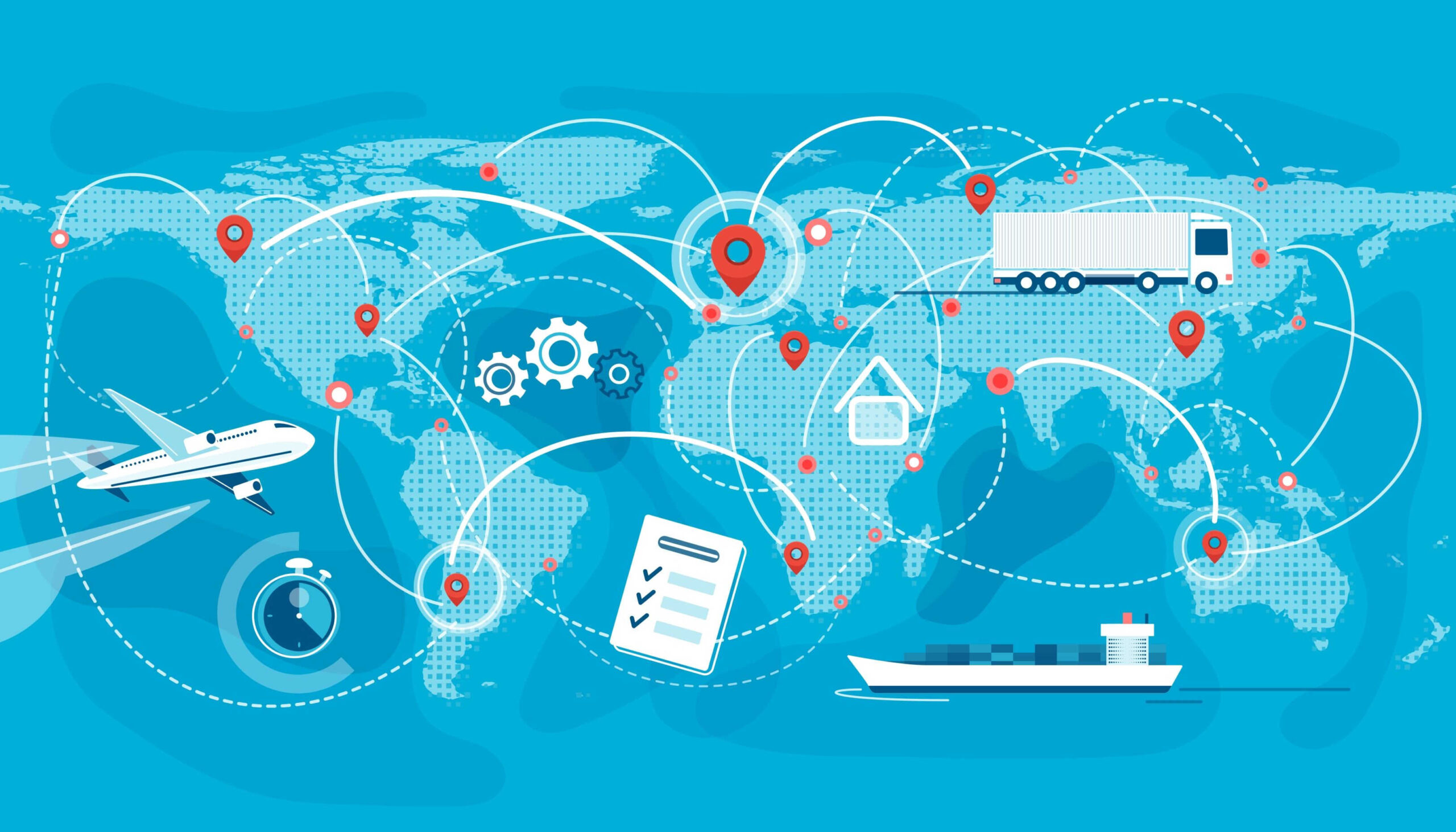What is ERP?
Enterprise Resource Planning (ERP) is a software system used to manage various business processes, including inventory management, manufacturing execution, and accounting. The software provides a centralized platform that streamlines different departments and allows for real-time data sharing, increasing organizational efficiency. ERP software is commonly used in logistics, supply chain management (SCM), and batch manufacturing.
Supply Chain Management (SCM)
Supply Chain Management software is commonly used in ERPs. The software provides real-time data on inventory levels, production schedules, and customer orders, allowing managers to optimize their supply chain processes and improve efficiency. With ERP software, organizations can monitor supplier performance, reduce lead times, and improve order fulfillment rates, enhancing customer satisfaction.
Warehouse Management
Warehouse Management allows organizations to manage inventory levels, track product movements, and optimize warehouse space utilization. With real-time data on inventory levels and location, managers can make informed decisions on how to allocate resources, reducing inventory carrying costs and improving order fulfillment times.
Material Requirements Planning (MRP)
Material Requirements Planning (MRP) simplifies and automates portions of production planning. The software provides a centralized platform for managing production schedules, inventory levels, and procurement activities. MRP helps organizations to optimize their purchasing, production processes, reducing costs and improving efficiency by ensuring that the right materials are available at the right time.
Accounting
Accounting functionalities, such as accounts payable, accounts receivable, and general ledger, helps organizations to automate financial processes, reduce errors, and improve financial accuracy. With streamlined financial reporting and compliance, organizations can optimize their accounting practices and enhance their overall financial performance.
In summary, ERP software provides numerous benefits to organizations across different business functions. From optimizing supply chain management and warehouse operations to improving material requirements planning and accounting, ERP software is a powerful tool for enhancing efficiency, reducing costs, and improving customer satisfaction. With its ability to provide real-time data and streamline business processes, ERP software is an essential tool for any organization looking to stay competitive in today’s fast-paced business environment.
What role do ERP systems play in manufacturing?
ERP systems play a crucial role in the manufacturing industry, enabling organizations to streamline their production processes, reduce costs, and improve product quality. Here are some ERP use examples in the cosmetic, pharmaceutical, food, and chemical manufacturing sectors.
In the cosmetics industry, ERP software helps manufacturers to manage their production schedules, track inventory levels, and ensure regulatory compliance. For example, Mar-Kov provides specialized ERP software for cosmetics manufacturers, allowing them to manage formulae, packaging, and labeling requirements, among other functionalities.
Similarly, in the pharmaceutical industry, ERP software is used to manage production execution, track testing results, and ensure FDA compliance. Mar-Kov provides pharmaceutical ERP software that helps manufacturers manage their quality control processes, lot tracking, and recipe management, among other functionalities.
In the food industry, ERP software is used to track inventory levels, ensure compliance, and track costing of all products. Mar-Kov provides specialized ERP software for food manufacturers that helps manage recipe management, batch tracking, and packaging requirements, among other functionalities.
In the chemical manufacturing industry, ERP software is used to manage complex production processes, track inventory levels, and manage formulations. Mar-Kov provides chemical manufacturing ERP software that helps manage recipe management, quality control, and lot tracking, among other functionalities.
Overall, ERP systems play a critical role in the manufacturing industry, enabling organizations to optimize their production processes, reduce costs, and improve product quality. With specialized ERP software for different manufacturing industries, such as cosmetics, pharmaceuticals, food, and chemicals, organizations can tailor their ERP systems to their specific needs, improving efficiency and competitiveness.
Applying an ERP system for manufacturing
Implementing an ERP system can be a complex process, requiring careful planning and execution. The first step in implementing an ERP system for manufacturing is to identify the specific needs and requirements of the organization. This involves assessing current processes and identifying areas where an ERP system can improve efficiency and productivity.
Once the organization has identified its needs, it can begin evaluating different ERP software options. Consider factors such as functionality, cost, and scalability, and selecting a system with experience with the organization’s specific needs.
After selecting an ERP system, the organization must prepare for implementation. This involves preparing data for migration, training employees, and counting inventory. It is essential to have a project manager or team responsible for overseeing the implementation process and ensuring that it stays on schedule.
During the implementation process, it is crucial to ensure that the ERP system is integrated with other systems and processes within the organization. This includes integrating the ERP system with supply chain management processes, such as procurement, inventory management, and logistics.
An important consideration in implementing an ERP system for manufacturing is the need to ensure regulatory compliance and GMP. With increasing regulatory requirements and consumer demand for transparency, it is essential for manufacturers to have a system in place that can track products and materials throughout the supply chain. Mar-Kov provides specialized ERP software for manufacturers, including traceability functionality and Electronic Batch Records helping to ensure compliance with regulatory requirements.
Overall, implementing an ERP system can be a significant undertaking, but the benefits for manufacturers are clear. By streamlining production processes, reducing costs, and improving efficiency, ERP systems help manufacturers to stay competitive and meet the evolving needs of their customers. Case studies, such as those provided by Mar-Kov, demonstrate how successful implementation of an ERP system can lead to significant improvements in productivity and profitability.
Best Manufacturing Practices
Implementing an ERP system can help organizations to adopt best manufacturing practices, such as lean manufacturing, Six Sigma, and total quality management. By providing real-time data on production, inventory, and logistics, ERP software enables organizations to identify areas of inefficiency and implement continuous improvement initiatives.
For example, with lean manufacturing, ERP software can help organizations to reduce waste, eliminate inefficiencies, and optimize production processes. By tracking production data and providing real-time information on inventory levels, organizations can ensure that they are producing only what is needed, reducing waste and increasing efficiency.
Similarly, with Six Sigma, ERP software can help organizations to improve quality control processes and reduce defects. By providing real-time data on production and quality control, organizations can identify areas of improvement and implement corrective actions to improve product quality and reduce defects.
Point of Use in Supply Chain Management
ERP software can be used at various points of use within the supply chain management process. For example, in procurement, ERP software can help organizations to manage supplier relationships, track purchase orders, and optimize procurement processes. In inventory management, ERP software can help organizations to track inventory levels, manage stock replenishment, and reduce carrying costs.
In logistics, ERP software can help organizations to optimize shipping routes, track shipments, and manage customer orders. By providing real-time data on inventory levels and order fulfillment, organizations can ensure that customer orders are fulfilled promptly and accurately.
Overall, ERP software can be used at various points of use within the supply chain management process, helping organizations to optimize their processes, reduce costs, and improve customer satisfaction. By providing real-time data and streamlining different business processes, ERP systems are an essential tool for organizations looking to stay competitive and meet the evolving needs of their customers.
In today’s fast-paced business environment, implementing an ERP system is essential for organizations looking to optimize their operations and stay competitive. Contact us any time to learn more.




